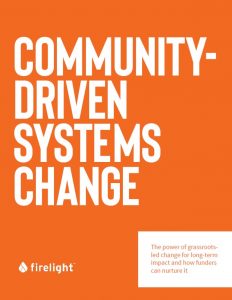A recent report from the Firelight Foundation explores the concept of community-driven systems change and provides practical guidance for donors.
 ‘Community-Driven Systems Change: The Power of Grassroots-Led Change for Long Term Impact and How Funders Can Nurture It’ offers an alternative approach to donors who have been reckoning with how they may be part of a larger system that is hindering community-led progress and perpetuating neo-colonial approaches to development. These funders – who have been examining their power structures amid the global pandemic and reckoning with racial inequity – are now being challenged to rethink community-led action as an often overlooked but powerful, scalable, and critical solution to what the world is facing.
‘Community-Driven Systems Change: The Power of Grassroots-Led Change for Long Term Impact and How Funders Can Nurture It’ offers an alternative approach to donors who have been reckoning with how they may be part of a larger system that is hindering community-led progress and perpetuating neo-colonial approaches to development. These funders – who have been examining their power structures amid the global pandemic and reckoning with racial inequity – are now being challenged to rethink community-led action as an often overlooked but powerful, scalable, and critical solution to what the world is facing.
‘The future of international development philanthropy must be rooted in the knowledge and experience of the people who are best positioned to bring about meaningful change – community members themselves,’ said Dr Sadaf Shallwani, Director of Learning and Evaluation at the Firelight Foundation.
‘In this report, we have laid the groundwork to help philanthropic institutions understand where existing practices are falling short and how they can rise to this historic moment and refocus on funding lasting, systemic change led by community-based organizations.’
Firelight’s report was created over a three-year period across nine countries, beginning in 2017. The Firelight Foundation undertook a process of inquiry, learning, co-creation, and validation with community-based organizations (CBOs) that produced these recommendations for philanthropic reform.
The report provides a robust outline for how funders can center CBOs in their philanthropic work by moving through the ‘what, why, and how’ of community-driven systems change. The report highlights the gap between how the global development sector and CBOs from eastern and southern Africa conceptualize success, effectiveness, and sustainability, while providing tools for donors to bring their work more into alignment with CBOs on the ground in communities.
‘When a CBO is (treated as) just an implementer, their power is not harnessed,’ said Moses Zulu of the Luapula Foundation in Zambia. ‘Even funders need to learn. CBOs come with a very rich contextual understanding, from which funders can learn. When donors assume they know best, they are perpetuating a myth of white saviorism that in fact only hinders development and change.’
To read the report, visit firelightfoundation.org.



Comments (0)